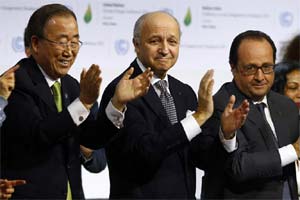After two weeks of intense negotiations and years of acrimonious debate, more than 190 countries Saturday adopted a new agreement on climate change that could force lasting changes on economic activities across the world and on the way people lead their lives.
Countries had come to Paris promising to deliver an agreement, and late Saturday evening succeeded in doing that after almost 48 hours of backroom negotiations since Thursday night.
“It is the moment of truth,” French Foreign Minister Laurent Fabius, who presided over the conference, said earlier in the day as he released a draft agreement text, the fifth and the last one that had come out during the course of this climate meet.
There were ecstatic reactions across the conference venue in Le Bourget just outside Paris, as Fabius announced that the agreement had been adopted. Ministers and negotiators from across the world stood up and clapped to welcome the announcement.
“We are happy to note that all concerns of India have been taken on board,” India’s Environment Minister Prakash Javadekar said earlier in the evening.
As negotiators gathered in the meeting room for the final time Saturday evening, the body language of the ministers and negotiators suggested that no further obstacle was being seen.
There were hugs and kisses, and selfies, all around, with the US Secretary of State John Kerry and former US Vice President Al Gore much in demand. Delegates, including Javadekar, went around the meeting room, shaking hands and congratulating each other.
The climate agreement is aimed at reducing the emission of greenhouse gases, sufficiently fast to keep the global average temperatures from rising beyond 2 degrees, possibly 1.5 degrees, from pre-industrial times.
The agreement will come into force 2020 and will replace the Kyoto Protocol, an existing international agreement on climate change that was finalised through the same process in 1997.
The Paris agreement, as it will be called, is much more comprehensive than the Kyoto Protocol which was limited to assigning greenhouse gas emission reduction targets for developed countries which are held responsible for global warming because of their uncontrolled emissions since the beginning of the industrial revolution.
This agreement asks every country to take climate actions — emission reductions or even just adaptation efforts — and inform the world about what it is doing.
Developed countries are supposed to do more than the developing countries and are required to take absolute emission reductions. Developed countries are also required to mobilise financial resources and help the developing world in dealing with the impacts of climate change.

